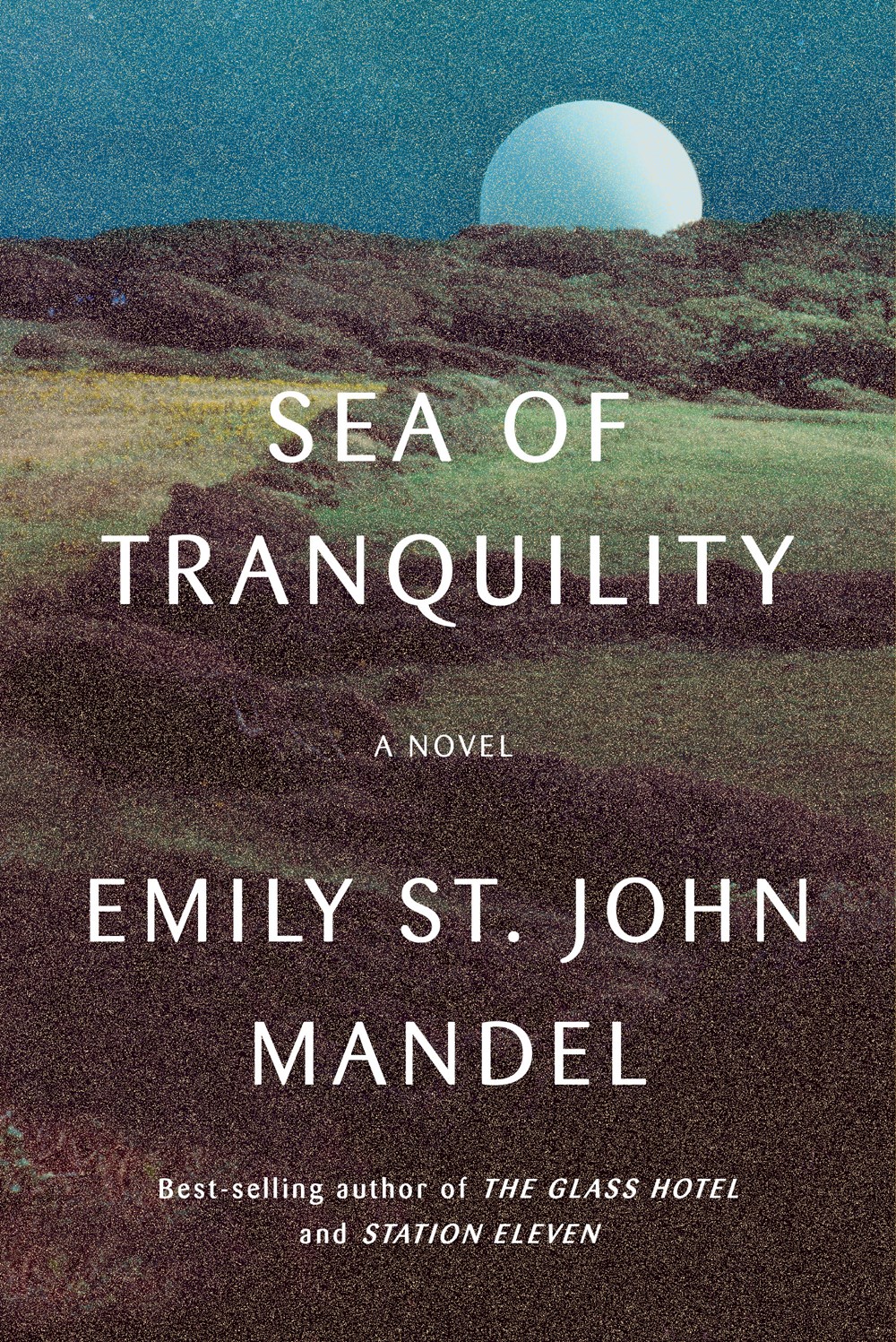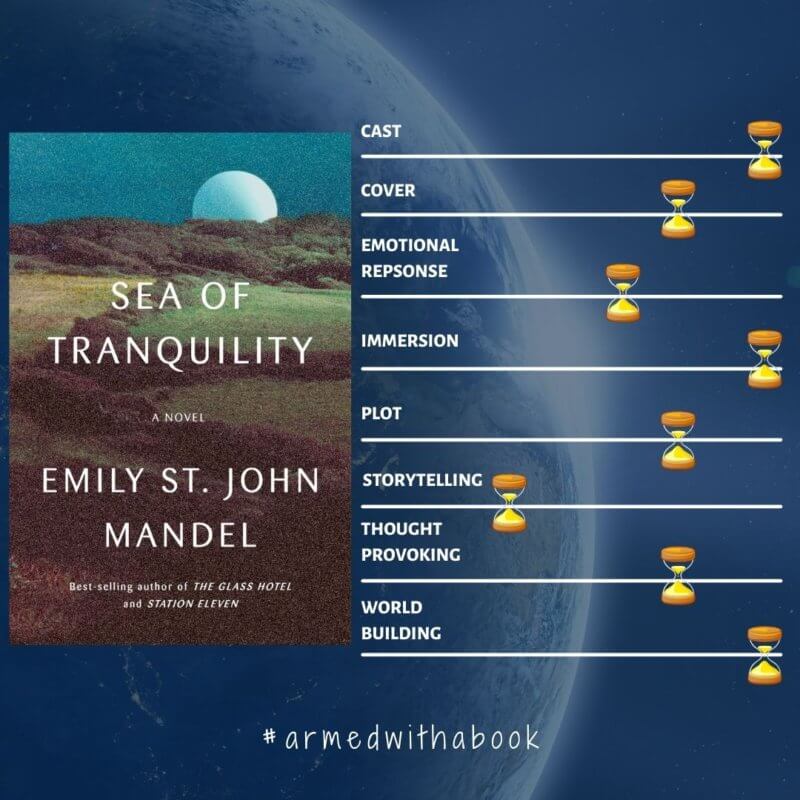In January 2020, Ariel and I read Station Eleven by Emily St John Mandel. It was an interesting atmospheric read and though I could not relate to it the same way as I did with Sea of Tranquility, Mandel’s latest book, having read it gave me a unique experience with the new one. Mare Tranquillitatis or the Sea of Tranquility is the place where humans first landed on the Moon and I love that the name of the book not only connects it to history but also brings a sense of calmness while reading it. That is the beauty of atmospheric writing I have found – it allows us to experience the world almost through a fog. There is a lot to decipher and if we pay attention, it can be a wonderful mystery to unfold. That is how I approached this book and I was not disappointed at all.

Edwin St. Andrew is eighteen years old when he crosses the Atlantic by steamship, exiled from polite society following an ill-conceived diatribe at a dinner party. He enters the forest, spellbound by the beauty of the Canadian wilderness, and suddenly hears the notes of a violin echoing in an airship terminal–an experience that shocks him to his core.
Two centuries later a famous writer named Olive Llewellyn is on a book tour. She’s traveling all over Earth, but her home is the second moon colony, a place of white stone, spired towers, and artificial beauty. Within the text of Olive’s bestselling pandemic novel lies a strange passage: a man plays his violin for change in the echoing corridor of an airship terminal as the trees of a forest rise around him.
When Gaspery-Jacques Roberts, a detective in the Night City, is hired to investigate an anomaly in the North American wilderness, he uncovers a series of lives upended: The exiled son of an earl driven to madness, a writer trapped far from home as a pandemic ravages Earth, and a childhood friend from the Night City who, like Gaspery himself, has glimpsed the chance to do something extraordinary that will disrupt the timeline of the universe.
A virtuoso performance that is as human and tender as it is intellectually playful, Sea of Tranquility is a novel of time travel and metaphysics that precisely captures the reality of our current moment.
Thoughts on Sea of Tranquility
On the Plot
Sea of Tranquility has a number of characters and it is only as the story unfolds that the main character starts to emerge. We experience our history through chapters set in 1912, 1918 and 2020, and then later re-experience it through stories and history told in the years 2203 and 2401. One of the words that came to mind as I was reading this book was cinematic. Maybe because I have adjusted to the atmospheric storytelling style that Mandel writes, I imagine the characters and the chapters being scenes from the characters’ lives. The slice of life narratives are quite engaging. I did not truly need to know the characters by their nature and virtues, I just needed to know how they fit in the puzzle I had been handed, one that in the beginning, I did not quite comprehend. It is all about slowly revealing the big picture with intricate details from different lives, some characters being so peripheral yet pivotal to the plot that one could almost miss them.
Time travel is one of my favorite subgenres to read! Often, I find myself wanting to know its intricacies and how it came to be, but Sea of Tranquility is written so beautifully that the mystery at hand about the anomaly that the time traveler is investigating is way more important than how he time travels and how it affects him. The main idea is how he affects the timeline.
Dark is an amazing show to watch about timelines and how they interact and if you haven’t seen that show yet, you need to go watch it. It is three seasons and once you get over the dubbed English, you will binge it. A lot of my understanding of time and how timelines get affected by time travel and the existence of loops and anomalies comes from that show.
On the Anomaly and The Simulation Hypothesis
A central part of the plot is the anomaly that the time traveler is investigating. A few people across centuries have had an unexplainable experience: by being at certain places at the right time, they have also been at another place simultaneously. The music in the air, the sound of wind in the background, the hollowness of the space… this incident affected them all in unique ways, some I learned about through the book, and some I can only guess.
The time traveler has been charged with investigating this incident because the mystery to the anomaly holds the answer to whether the people are stuck in a simulation. Now you are thinking of the Matrix, because I was too and the latest movie did a great job of explaining why the machines made the Matrix as hellish as it was. Why it was not perfect. Because we get bored and we constantly need challenges to stay engaged.
The idea of simulation hypothesis and the different centuries bleeding into one another at the anomaly made the plot sometimes hard to follow. It’s like I knew what was happening but I could not put it into words.
On History
As I read Sea of Tranquility, I was thinking of Station Eleven sometimes, partly because one of the characters was on a book tour for her pandemic fiction book. Even if the link may have been hard to convince anyone of, I was reminded of the author’s other tales and having experienced the pandemic first hand, I found thinking about it and comparing it to how it is portrayed in the book. Olive, the author, has researched pandemics from centuries ago and I learned so much from her lectures. She had her struggles as a mother and wife, who is traveling as part of her job, but at the same time, she is experiencing what it means to write a book that impacts people, while at the same time, educating them of what she has learned from history.
Imagining the pandemic after 200 years and then retelling in another 200 years was quite surreal.
On Post Apocalyptic Fiction
By traversing so much time and through the novelist, Olive’s perspective, Sea of Tranquility ponders a question that I am sure many readers have asked themselves in recent years – why is there so much post-apocalyptic fiction? Why do some people refuse to read it while others quite enjoy the genre? They are not always stories of hope but at the end of the day, I enjoy exploring the what-ifs.
When COVID first started in 2020, didn’t we all have thoughts about this being the end of the world? Even if we did not know the extent of what was going to happen, we had inklings of how this was going to change life drastically. And it did. With working from home (two full years for me), being unable to travel to family and friends, one Christmas celebrating festivities in secret as it was very much a taboo, life has come a long way. And it continues to evolve.
Reading so many different years in Sea of Tranquility made me wonder about longevity of life and memory. What we see in our lives is such a small part of the world events, of the experience that humans have and continue to have. I really like the idea of looking at centuries as different worlds. No one person remembers the change. I wasn’t here in the 1800s and for sure, I won’t know 2200s either.
Personal Reflections
This book, like Station Eleven, comes full circle. It leaves just enough room for the reader to imagine what happens next. It tangled me in its plot in such a way that I could not let go and from a reader, I quickly transitioned to a student, taking notes, highlighting sections. It was like being on a boat that is following the path that the river is taking. I don’t have control but I have the choice to enjoy the view and see what happens next.
I was very excited when I was approved to read Sea of Tranquility. I wanted to give Mandel’s writing another try and I am so glad I did. She took time travel and made it into something remarkable and unforgettable. This story will always be with me and while I won’t know the characters very well, when I think of time, The Matrix, Dark or time-travel, I will think of all of them. I will imagine the world of the 2200s and 2400s that Mendel created with minimal details in my head.
You might enjoy Sea of Tranquility if you have enjoyed Dark (on Netflix) and The Matrix. Other books that I was reminded of were Station Eleven (of course) and The Psychology of Time Travel by Kate Mascarenha. Check out the discussion with Ariel about the former here and my review of the latter here.

Will you pick up this book?
Add it to your shelves on Goodreads and Storygraph.
Many thanks to the publisher for providing me a complimentary copy of the book in exchange for an honest review.
Cover Photo by malith d karunarathne on Unsplash

Be First to Comment